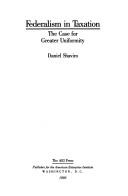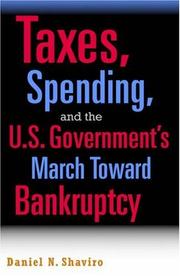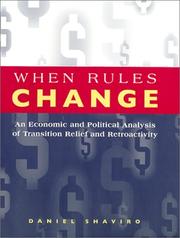| Listing 1 - 10 of 10 |
Sort by
|

ISBN: 0844738220 9780844738222 Year: 1993 Publisher: Washington: American enterprise institute press,
Abstract | Keywords | Export | Availability | Bookmark
 Loading...
Loading...Choose an application
- Reference Manager
- EndNote
- RefWorks (Direct export to RefWorks)
Intergovernmental tax relations --- Fiscal policy --- Taxation --- Interstate commerce --- Law and legislation --- US / United States of America - USA - Verenigde Staten - Etats Unis --- 336.200 --- 336.61 --- 336.50 --- Belastingstelsel: algemene naslagwerken en principes. --- Financieel beleid. --- Provinciale en gemeentelijke financiën: algemeenheden. --- Commerce --- Belastingstelsel: algemene naslagwerken en principes --- Provinciale en gemeentelijke financiën: algemeenheden --- Financieel beleid --- Intergovernmental tax relations - United States. --- Fiscal policy - United States. --- Taxation - Law and legislation - United States. --- Interstate commerce - Taxation - United States.

ISBN: 0226751120 0226751139 9786611430528 1281430528 0226751155 9780226751153 9780226751122 Year: 1997 Publisher: Chicago : University of Chicago Press,
Abstract | Keywords | Export | Availability | Bookmark
 Loading...
Loading...Choose an application
- Reference Manager
- EndNote
- RefWorks (Direct export to RefWorks)
Do deficits matter? Yes and no, says Daniel Shaviro in this political and economic study. Yes, because fiscal policy affects generational distribution, national saving, and the level of government spending. And no, because the deficit is an inaccurate measure with little economic content. This book provides an invaluable guide for anyone wanting to know exactly what is at stake for Americans in this ongoing debate. "[An] excellent, comprehensive, and illuminating book. Its analysis, deftly integrating considerations of economics, law, politics, and philosophy, brings the issues of 'balanced budgets,' national saving, and intergenerational equity out of the area of religious crusades and into an arena of reason. . . . A magnificent, judicious, and balanced treatment. It should be read and studied not just by specialists in fiscal policy but by all those in the economic and political community."-Robert Eisner, Journal of Economic Literature "Shaviro's history, economics, and political analysis are right on the mark. For all readers."-Library Journal
336.121 <73> --- 336.1 <73> --- 336.2 (73) --- US / United States of America - USA - Verenigde Staten - Etats Unis --- 336.451 --- 336.61 --- 336.020 --- 336.401 --- Budget deficits --- -Government spending policy --- -Fiscal policy --- -339.5230973 --- Tax policy --- Taxation --- Economic policy --- Finance, Public --- Expenditures, Public --- Public spending policy --- Spending policy, Government --- Full employment policies --- Unfunded mandates --- Deficits, Budget --- Budget --- Deficit financing --- Nationaal budget. Rijksbegroting. Staatsbegroting. Begrotingspolitiek--Verenigde Staten van Amerika. VSA. USA --- Public finance, government finance in general--Verenigde Staten van Amerika. VSA. USA --- Belastingsakkoorden. Belastingswezen--Verenigde Staten van Amerika. VSA. USA --- Begrotingsjaren en begrotingsstaten. Rijksmiddelenbegroting. Begrotingstekort. --- Financieel beleid. --- Omvang, indeling en evolutie van de overheidsuitgaven: algemeenheden. --- Verband tussen begrotingspolitiek en economische evolutie. --- Government policy --- Fiscal policy --- Government spending policy --- 336.2 (73) Belastingen. Belastingswezen. Openbare financien. Belastingspolitiek. Belastingstheorie. Belastingsharmonisatie. Fiskale politiek. Belastingsleer. Belastingsdruk. Belastingstechniek. Belastingsstelsel.Belastingstarief--Verenigde Staten van Amerika. VSA. USA --- 336.2 (73) Belastingsakkoorden. Belastingswezen--Verenigde Staten van Amerika. VSA. USA --- Belastingen. Belastingswezen. Openbare financien. Belastingspolitiek. Belastingstheorie. Belastingsharmonisatie. Fiskale politiek. Belastingsleer. Belastingsdruk. Belastingstechniek. Belastingsstelsel.Belastingstarief--Verenigde Staten van Amerika. VSA. USA --- 336.1 <73> Public finance, government finance in general--Verenigde Staten van Amerika. VSA. USA --- 336.121 <73> Nationaal budget. Rijksbegroting. Staatsbegroting. Begrotingspolitiek--Verenigde Staten van Amerika. VSA. USA --- 339.5230973 --- Omvang, indeling en evolutie van de overheidsuitgaven: algemeenheden --- Verband tussen begrotingspolitiek en economische evolutie --- Begrotingsjaren en begrotingsstaten. Rijksmiddelenbegroting. Begrotingstekort --- Financieel beleid --- deficit, fiscal policy, economics, generational distribution, national saving, government spending, budget, debt, nonfiction, balanced budgets, intergenerational equity, law, politics, philosophy, tax lag, social security, legislation, interest rates, line-item veto, macroeconomics, political economy, finance, growth, prosperity, wealth.
Book
ISBN: 0190224770 0199359776 0199359768 9780199359769 9780199359776 9780199359752 019935975X Year: 2014 Publisher: New York : Oxford University Press,
Abstract | Keywords | Export | Availability | Bookmark
 Loading...
Loading...Choose an application
- Reference Manager
- EndNote
- RefWorks (Direct export to RefWorks)
International tax rules, which determine how countries tax cross-border investment, are increasingly important with the rise of globalisation, but the modern US rules are widely recognised as dysfunctional. The existing debate is stuck in a sterile dialectic, in which ostensibly the only permissible choices are worldwide or residence-based taxation of US companies with the allowance of foreign tax credits, versus outright exemption of the companies' foreign source income. In this book, Shaviro explains why neither of these solutions addresses the fundamental problem at hand.
International business enterprises --- Income tax --- Corporations, American --- Investments, Foreign --- Double taxation --- Taxation --- Law and legislation --- Foreign income. --- American corporations

ISBN: 9780511618253 9780521869331 9780521689588 9780511349898 0511349890 0521869331 0521689589 0521689589 1107171296 1281085960 9786611085964 0511350791 0511349025 0511348053 0511573545 0511618255 Year: 2007 Publisher: Cambridge Cambridge University Press
Abstract | Keywords | Export | Availability | Bookmark
 Loading...
Loading...Choose an application
- Reference Manager
- EndNote
- RefWorks (Direct export to RefWorks)
The United States is moving toward a possible catastrophic fiscal collapse. The country may not get there, but the risk is unmistakable and growing. The 'fiscal language' of taxes, spending, and deficits has played a huge and under appreciated role in the decisions that have pushed the nation in this dangerous direction. Part of the problem is that by focusing only on the current year, deficits permit politicians to ignore what is looming down the road. The bigger problem lies in the belief, shared by people on the left and the right alike, that 'tax cuts' and 'spending cuts' lead to smaller government, when in fact the characterization of any new policy as a change in 'taxes' or in 'spending' is purely a matter of labeling. This book proposes a better fiscal language for US budgetary policy, rooted in economic fundamentals such as wealth distribution and resource allocation in lieu of 'taxes' and 'spending'.
Fiscal policy --- Taxation --- Budget deficits --- Business, Economy and Management --- Economics

ISBN: 0226751147 Year: 2000 Publisher: Chicago : University of Chicago Press,
Abstract | Keywords | Export | Availability | Bookmark
 Loading...
Loading...Choose an application
- Reference Manager
- EndNote
- RefWorks (Direct export to RefWorks)
Taxation --- Law reform --- Retroactive laws --- Law and legislation --- Economic aspects --- Economic aspects.
Digital
Year: 1999 Publisher: Cambridge, Mass. National Bureau of Economic Research
Abstract | Keywords | Export | Availability | Bookmark
 Loading...
Loading...Choose an application
- Reference Manager
- EndNote
- RefWorks (Direct export to RefWorks)
Book
ISBN: 9780674030978 0674030974 Year: 2008 Publisher: Cambridge, Mass.: Harvard university press,
Abstract | Keywords | Export | Availability | Bookmark
 Loading...
Loading...Choose an application
- Reference Manager
- EndNote
- RefWorks (Direct export to RefWorks)
Finance, Public --- Fiscal policy --- 336.200 --- 336.204 --- 336.23 --- AA / International- internationaal --- Belastingstelsel: algemene naslagwerken en principes --- weerslag, invloed, last en verdeling van de belasting --- Belastingen van de lokale besturen --- Finance, Public - Congresses --- Fiscal policy - Congresses
Book
ISBN: 0735512205 Year: 2002 Publisher: New York (N.Y.) : Aspen law and business,
Abstract | Keywords | Export | Availability | Bookmark
 Loading...
Loading...Choose an application
- Reference Manager
- EndNote
- RefWorks (Direct export to RefWorks)
Income tax --- Law and legislation --- Cases.

ISBN: 0735537488 Year: 2003 Publisher: New York, NY : Aspen Publishers,
Abstract | Keywords | Export | Availability | Bookmark
 Loading...
Loading...Choose an application
- Reference Manager
- EndNote
- RefWorks (Direct export to RefWorks)
Book
Year: 1999 Publisher: Cambridge, Mass. National Bureau of Economic Research
Abstract | Keywords | Export | Availability | Bookmark
 Loading...
Loading...Choose an application
- Reference Manager
- EndNote
- RefWorks (Direct export to RefWorks)
This paper aims to provide a swift tour of the economic issues presented by vouchers and thus to fill an apparent gap in the literature for a basic survey of the subject. Among the issues it considers are: factors determining a voucher's cash-equivalence; reasons (such as paternalism, externalities, and distribution) for giving beneficiaries non-cash-equivalent vouchers rather than cash; optimal tax issues involved in the design of vouchers and the choice between vouchers and other delivery mechanisms, including factors determining the optimal marginal reimbursement rate (MRR) in a voucher program, and the similarity between this question and that of determining optimal marginal tax rates (MTRs) under the income tax; the incentive effects of voucher eligibility criteria, such as income or asset tests; factors determining the allocative and price effects of vouchers, both in the short run when unexpectedly enacted and at equilibrium; and factors relevant to the choice between private and public supply that may often overlap with the decision whether to adopt a voucher program.
| Listing 1 - 10 of 10 |
Sort by
|

 Search
Search Feedback
Feedback About UniCat
About UniCat  Help
Help News
News